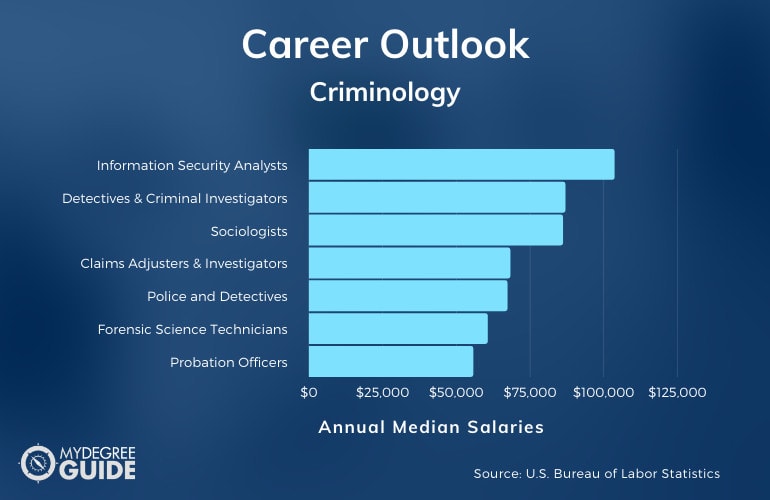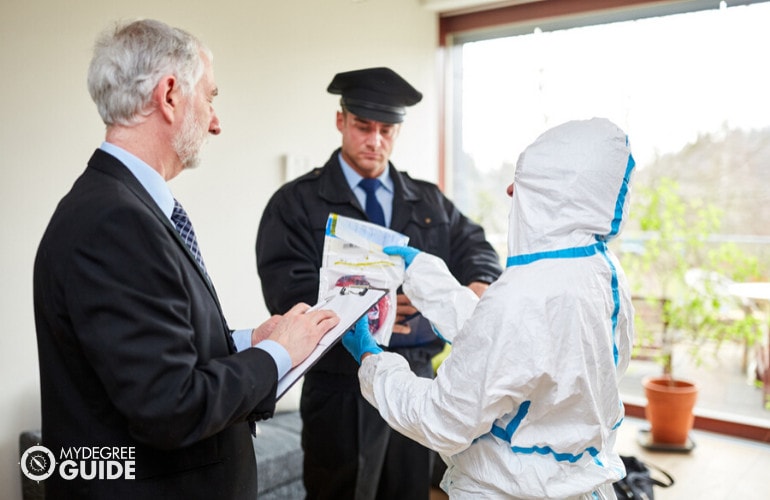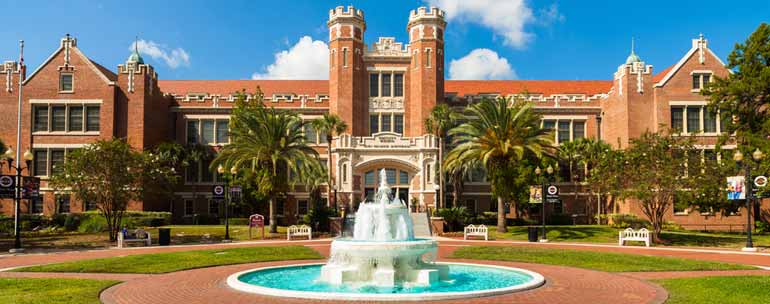If you want to study the causes and impact of crime, care about criminal justice policy, or have a fascination with criminal psychology, then you might consider earning an online criminology degree.

Many professionals who study criminology go on to work with policing, law, or law enforcement.
Editorial Listing ShortCode:
This kind of degree can be a stepping stone toward many types of career paths.
Online Criminology Degrees
Criminology degree programs often include courses related to policing and crime investigation methods, but there’s more to it than that.
Editorial Listing ShortCode:
Course topics in a criminology program will typically be informed by insights and research from a range of fields. These fields can include sociology, various branches of psychology, law, and even biology or anthropology.
Criminology programs typically offer courses related to:
- Policing methods, practices, and policies
- Criminal justice policy and criminal justice systems
- Criminal behavior and psychology
- Criminal law
Programs can also offer different specialty topics, such as organized crime, cybercrime, terrorism, urban crime, race and policing, and more. If you like multidisciplinary fields of study and have an interest in policing, law, and sociology, then an online criminology bachelors degree might be a good fit for you.
Criminology Careers & Salaries

Qualifications in the field of criminology can be a pathway to many different types of career sectors, depending on your area of concentration and your own professional interests.
Since criminology can intersect with different career paths, researching how to qualify for specific jobs can help inform your educational decisions. Many criminology-related careers can require graduate degrees or additional specialized training.
According to the Bureau of Labor Statistics, the following careers can benefit from criminology studies.
| Careers | Annual Median Salaries |
| Information Security Analysts | $103,590 |
| Detectives and Criminal Investigators | $86,940 |
| Sociologists | $86,110 |
| Claims Adjusters, Examiners, and Investigators | $68,270 |
| Police and Detectives | $67,290 |
| Forensic Science Technicians | $60,590 |
| Probation Officers and Correctional Treatment Specialists | $55,690 |
| Paralegals and Legal Assistants | $52,920 |
| Correctional Officers and Bailiffs | $47,440 |
| Social and Human Service Assistants | $35,960 |
Law enforcement is a common career path in this field, and many individuals enter it with a criminal justice associates degree, but there are other options to think about as well. If you’re interested in pursuing a professional law degree, you might consider getting an undergraduate degree in criminology as a solid foundation to build upon.
Editorial Listing ShortCode:
The study of criminology also involves some topics related to careers in psychology, such as forensic psychologist. With cybercrime on the rise, some criminology majors may pursue future studies in information security. This training combination can be applicable to jobs that relate to both information security and law enforcement.
BS in Criminology Curriculum & Courses

Criminology programs typically expose students to the field by helping them understand fundamentals from related disciplines, such as sociology, psychology, law, biology, and anthropology. Here are examples of courses you may come across in a criminology program:
- Introduction to Criminology: This course is a survey of methods and concepts in criminology. This course also surveys institutions and policies related to crime prevention, investigation, and criminal treatment.
- Social Psychology: You’ll learn key concepts related to the study and analysis of group dynamics and social behaviors, and you’ll learn how collective norms influence individual behaviors, attitudes, and perceptions.
- Policing and Investigative Methods: You’ll explore objective policing and investigative methods used in law enforcement today. This course includes an overview of social research related to policing practices and methods.
- The Criminal Justice System: From historical, public-policy, and sociological perspectives, you’ll learn about criminal law, criminal courts, courtroom procedures, and correctional treatment facilities.
- Introduction to Sociology: This course is an overview of key topics in sociology, including fundamental concepts related to social and cultural norms and the understanding of the individual’s place in society.
- Abnormal Psychology: This course is an introduction to key topics related to psychological and behavioral disorders, including deviance and anti-social behaviors.
- Psychology and Criminal Justice: This foundational criminal psychology course covers topics at the intersection of psychology and law enforcement.
- Criminal Law and Ethics: This course covers both legal and ethical aspects of criminal justice systems.
- Criminal Justice and Society: You’ll learn about how crimes and criminal justice systems and policies impact society.
- Introduction to Forensic Psychology: This course is a thorough overview of the concepts and methods used for criminal profiling, crime scene analysis, and crime-related psychological treatments and interventions.
Most criminology online degrees will include the study of criminal justice policies and systems, similar to online criminal justice degree programs, but will also explore the psychological and sociological perspectives on criminality. Specific course offerings will vary by school and program.
How to Choose an Online Degree in Criminology Program

Online programs in criminology, criminal justice, and forensic psychology are likely to have some course topics that overlap. When you’re choosing a program, it can help to consider which major and program best match your goals.
Here are some important program features to consider when choosing an online degree in criminology:
- Elective courses and specializations offered for the major
- Online vs. hybrid study options
- Admissions requirements
- Options for full-time, part-time, or accelerated learning
- Tuition costs
Researching and comparing available programs can assist you in determining which ones best align with your professional goals and learning needs.
How to Become a Criminologist

Professional criminologists do work that is objective, analytical, and based on empirical and experimental knowledge from sociology and psychology. Becoming a criminologist involves studying a range of topics and disciplines, with variations based on your area of specialization.
Here are some common steps to becoming a criminologist:
- Bachelor’s degree. You can get a bachelor’s degree in criminology or a related field, such as psychology or sociology.
- Master’s degree. You can get your masters in criminology. A masters is typically required to work as a criminologist.
- Internship. Completing an internship or field study can enhance your qualifications in the workforce.
- Licensure. Some state boards require criminologists to be licensed. Obtaining licensure involves meeting your states educational and professional requirements as well as passing an exam.
If you want to advance your education and qualifications even further, you can decide whether you want to pursue a professional doctorate in criminology. Your area of specialization and career goals can also help guide you as you make decisions about what kinds of degrees and certifications to pursue.
Admissions Requirements

Admissions requirements can vary by school and program, but common requirements for earning undergraduate criminology degrees online include:
- High school diploma or GED
- Satisfactory GPA
- Personal statement
- SAT or ACT scores (only some schools require them)
Not all programs have the same requirements, so you may want to compare admissions policies as you check out your online options.
Accreditation

There are many benefits to attending a regionally accredited school. A school’s accreditation status can impact the transferability of your credits as well is your eligibility to apply to graduate school or pursue professional licensing.
Attending an accredited institution helps ensure that you’ll be getting a rigorous learning experience, qualified faculty, and appropriate levels of student programming and support. Regional accreditation typically offers the best assurances, and accreditation can also be a pre-condition for some forms of financial aid.
Editorial Listing ShortCode:
To learn more about accreditation, or to find accredited schools, you can check out the Council for Higher Education Accreditation (CHEA).
Financial Aid and Scholarships

One of the first challenges you may encounter when pursuing a bachelor’s degree is paying tuition and other upfront costs.
Tuition costs can vary from school to school. You may want to keep that in mind as you’re selecting the right program for your needs and goals if you have any concerns about costs.
There are also various types of financial aid available to students who qualify. Financial aid options can include federal or state grants, scholarships, and student loans. Terms of financial aid packages can vary, so it’s beneficial to review all offers carefully.
If you plan to seek need-based financial aid, you can start by submitting the Free Application for Federal Student Aid (FAFSA).
What Is Criminology?

Criminology is the study of crime, criminal behavior, and the criminal justice system through the lens of disciplines such as sociology, biology and genetics, history, and psychology.
Criminologists examine the roots of criminal behavior as well as the social impacts of crime. They can help prevent, investigate, or predict criminal actions. Some criminologists specialize in criminal justice systems and policies, while others may focus more on criminal psychology.
A criminologist may also study criminal justice institutions, policing methods, and policies designed to help explain and reduce recidivism. Criminologists tend to work in law enforcement roles, conduct public policy research and analysis, or work in academia.
What Can You Do with a Criminology Degree?

A bachelors degree in criminology can be applicable to jobs in law enforcement or in correctional treatment facilities. Those with a bachelors in criminology might also train to work as a forensic science technician.
Many professionals in the field of criminology hold masters or doctorate degrees. Criminology professionals with more advanced degrees might find work in law enforcement, public policy and social research, or law. They may also gain specialized training to enter the field of forensic psychology.
With computer science training, a professional in this field could apply concepts from criminology to cybersecurity work.
Is Criminology a Good Career?

Yes, criminology is a good career for many professionals. Professionals with a background in criminology might use their specialized education and training to work with local, state, or federal law enforcement and investigative agencies.
Completion of one of the masters programs in criminology offered by a growing number of universities is often required to work as a criminologist. Entry-level careers in the field of criminal justice—such as law enforcement officer, probation officer, or correctional treatment specialist—generally only require a bachelors-level education.
Criminology can also act as a foundation for further studies in related fields, such as law, sociology, psychology, and forensic psychology. Professionals with a masters or PhD in Criminology can pursue careers as postsecondary teachers and academic researchers as well.
Can You Study Criminology Online?

Yes, there are accredited schools that offer online bachelors degree programs in criminology.
Many students choose to get their criminology bachelor’s degree online because they enjoy having more flexible study options. Those interested in a criminology major might also choose online options in order to have more schools and a wider variety of study programs to choose from.
Also worth noting is that a growing number of universities offer online masters degrees and online PhD in Criminology programs.
Editorial Listing ShortCode:
Some criminology online programs offer accelerated study options as well as more flexible, part-time study designs.
How Long Does It Take to Get a Criminology Degree Online?
Most bachelor’s degree programs generally require 4 years to complete if you’re following a 16 week semester and attending full-time.
Some online programs offer more accelerated timelines, often following an 8 week semester. With shorter terms and full-time, year-round study, you may finish your degree in less time.

How long it takes to get your criminology degree can vary based on the kind of program you’re enrolled in as well as your personal circumstances. Some people will find that online programs offer more options to choose from when it comes to finding a study schedule and graduation timeline that best fits their needs and goals.
What Jobs Can You Get with a Criminology Degree?
Some professionals who hold a bachelors in criminology may work as police officers, probation officers, or correctional treatment specialists.
Criminologists, sociologists, and forensic psychologists often have masters or doctoral degrees. A number of jobs in criminology or related fields may require graduate degrees and specialized professional licensing. A growing number of universities also offer homeland security masters degree programs to students wanting to specialize in this field.
Where Do Criminologists Work?

There are many different settings in which a criminologist might work. It will often depend on their professional interests and areas of specialization they choose to pursue.
It is not uncommon for criminologists to work in law enforcement or related fields. For example, a criminologist may work with a law enforcement agency doing police work or participating in criminal investigations.
Some criminologists apply their skills in the law enforcement sector as probation officers. They may also pursue work as social workers, providing counseling and other rehabilitative services at juvenile detention centers or adult correctional facilities.
Editorial Listing ShortCode:
Some professionals with a background in criminology go on to earn additional degrees and specialized training to work in criminal law. Depending on their degree paths, they might work as legal assistants, lawyers, or public prosecutors or defenders.
Criminologists with advanced degrees might also work in postsecondary education or engage in social research or public policy development and reform.
How Much Does a Criminologist Make?

How much someone makes as a criminologist is going to vary based on many factors, including their qualifications, work experience, industry, and other individual circumstances.
That said, police and detectives make a median salary of $67,290 each year, and the median salary for probation officers and correctional treatment specialists is $55,690 (Bureau of Labor Statistics).
The Bureau of Labor Statistics does not give specific data for a criminologist’s salary, but it does give the median pay for a sociologist, which is $86,110. Most employers prefer criminologists and sociologists to hold a masters degree.
If you’re thinking about majoring in criminology, it’s beneficial to research the qualifications required for the careers that most interest you.
What’s the Difference Between a Bachelor of Criminology vs. Criminal Justice?
These two majors have some overlapping areas of study, but there are several factors that distinguish a bachelors in criminology from a bachelors in criminal justice.
| Bachelor’s in Criminology | Bachelor’s in Criminal Justice |
|
|
In short, a criminology curriculum will have more of an emphasis on the social and psychological aspects of criminal behavior and how criminal justice systems relate to criminal behavior and crime statistics.
What’s the Difference Between a Bachelor’s Degree in Criminology vs. Forensic Psychology?
Since forensic psychology is a branch of general psychology, this major will likely focus less on policing and criminal justice systems and more on criminal psychology and behavior. Criminology majors will most likely learn about topics in forensic psychology.
| Bachelor’s in Criminology | Bachelor’s in Forensic Psychology |
|
|
As you can see, both of these majors include some common areas of study, but forensic psychology is a branch of psychology, while criminology is a branch of sociology. Many forensic psychologists provide very specialized legal or court-related functions.
Is a Criminology Degree Worth It?

Yes, a criminology degree is worth it for many students. A criminology degree offers you the opportunity to study a fascinating sector of social policy while also blending insights from psychology, law, public policy, and history.
Some professionals in this field work in policing or corrections. Others try to help correctional facilities, improving policies or supporting rehabilitation programs. The Bureau of Labor Statistics projects 5% job growth for police and detectives and expects 4% job growth for probation officers and correctional treatment specialists.
Editorial Listing ShortCode:
Some students use a criminology degree as a stepping stone toward a masters degree in criminology or a related field. Those with advanced training may pursue social research or public policy research and advocacy.
Universities Offering Online Bachelors in Criminology Degree Programs
Methodology: The following school list is in alphabetical order. To be included, a college or university must be regionally accredited and offer degree programs online or in a hybrid format.

Arizona State University offers an online program for a Bachelor of Science in Criminology and Criminal Justice. To graduate, students must complete 40 classes. Each class is 7.5 weeks long. Applicants must have a minimum GPA of 3.0 or acceptable ACT or SAT test scores.
ASU is accredited by the Higher Learning Commission.

Arkansas State University offers an online program for a Bachelor of Arts in Criminology. The program requires students to complete 120 credit hours, with the option to transfer in up to 90 qualifying credit hours. Applicants must have a high school GPA of 2.75 or higher and official ACT and SAT scores.
Arkansas State University is accredited by the Higher Learning Commission.

Carlow University offers an online program for a Bachelor of Arts in Criminology. The program requires 120 credit hours to graduate and can typically be completed in 4 years. Applicants may apply online with copies of their official high school transcripts. To be eligible for the program, applicants should have a GPA of 2.0 or higher.
Carlow University is accredited by the Middle States Commission on Higher Education.

Florida State University offers an online Bachelor’s in Criminology program. To graduate, students must maintain a GPA of 2.0 and complete either a minor or a full-time internship. Applicants must apply through the school’s website with self-reported academic records, high school transcripts, ACT or SAT scores, and answers to an essay question.
The Florida State University is accredited by the Commission on Colleges of the Southern Association of Colleges and Schools.

Loyola University New Orleans offers an online program for a Bachelor of Criminology and Justice. To graduate, students must complete 120 credit hours, with 35 credit hours dedicated towards the major. Those interested in the program may apply online with copies of their official high school transcripts.
Loyola University New Orleans is accredited by the Southern Association of Colleges and Schools Commission on Colleges.

Missouri State University offers both a Bachelor of Science and a Bachelor of Arts in Criminology and Criminal Justice. To graduate, students must complete a minimum of 120 credit hours, with 45 hours dedicated to the major. Applicants may apply to the school. If accepted, they need to declare their major before completing 60 credit hours.
Missouri State University is accredited by the Higher Learning Commission.

Regis University offers a Bachelor of Science in Criminology. To graduate, students must complete 120 credit hours, including a capstone project. Those interested in the program must apply online with official transcripts from any prior schools attended, proof of a high school diploma or the equivalent, and a resume.
Regis University is accredited by the Higher Learning Commission.

Saint Mary-of-the-Woods College offers a Bachelor of Science in Criminology. To graduate, students must complete 120 credit hours and have the option to add a minor or a concentration to the degree.
To apply, applicants must complete an online application and submit it along with copies of their official high school transcripts. Applicants may choose to submit ACT or SAT scores along with their applications.
Saint Mary-of-the-Woods College is accredited by the Higher Learning Commission.

The University of Florida offers an online Bachelor of Arts in Criminology program. To graduate, students must complete 11 courses, including 6 electives. To be eligible for the program, applicants must have a minimum GPA of 2.5 and must submit ACT and SAT test scores if they have graduated from high school within the last 5 years.
The University of Florida is accredited by the Southern Association of Colleges and Schools Commission on Colleges.

The University of North Carolina—Wilmington offers a Bachelor of Arts in Criminology. Students may choose a concentration in Criminology, Criminal Justice, or Public Criminology. Applicants may apply online through the school’s website. Those with an associate degree may also transfer qualifying credits into the program.
The University of North Carolina Wilmington is accredited by the Southern Association of Colleges and Schools Commission on Colleges.
Getting Your Criminology Degree Online

Criminology essentially combines sociology and criminal justice studies. A bachelors in criminology can help you qualify for entry-level positions in law enforcement and corrections, and it can also act as a foundation for further, specialized study.
Criminology can be a fascinating major, and there are a number of online programs out there. Credible online degrees are offered by fully accredited universities. Online learning allows you to learn remotely, often with a highly flexible schedule.
If you’re interested in pursuing this unique major, why not start exploring online criminology programs today?

